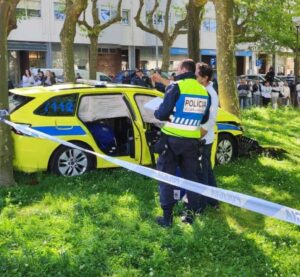Government’s ‘immediate’ SOS plan will take time to implement, admits INEM
After all the positive PR about an immediate SOS plan to bolster Portugal’s failing ‘112’ emergency response, the reality is that deaths of people waiting for ambulances have continued.
When we wrote our story “Outrage as life and death calls are left waiting to be answered”, government channels were quick to point to the SOS plan in the making. But INEM – the national institute for medical emergencies – has been forced to admit that the contingency measures will take time. They won’t be “immediate” as the initial press announcements guaranteed. And thus, people will continue to be ‘left hanging on the phone’ when what they really need is prompt, professional emergency response.
According to tabloid Correio da Manhã this morning, the number of deaths linked to this shambolic state of affairs has now climbed to six. That is, six people whose states of health resulted in 112 calls were left waiting for assistance long enough for that assistance to appear to have come ‘too late’.
Every alleged ‘victim’ so far has been over the age of 70, which, for some, may reduce the indignation, but for others – particularly family members of the six deceased – it will be very cold comfort.
Imagine, for a moment, that you are over the age of 70, and not in the best of health. The awareness, right now, that should you require medical help fast in Portugal, it is unlikely to arrive in time, is not reassuring.
Health minister Ana Paula Martins has made no bones of the fact that INEM is struggling under “an enormous lack of resources”, which existed even before the current strike over overtime waged by pre-hospital emergency technicians.
Today, STEPH, the syndicate representing those technicians, warned that the SOS plan announced yesterday cannot be seen as a magic wand (even when it is ready to work…)
“There were already constraints before the strike. In fact, the biggest peak in calls last week was on Monday, and we weren’t on strike then,” STEPH president Rui Lazaro tells Lusa.
Asked then if the contingency measures announced will solve constraints, Lazaro replied “absolutely not”, albeit some ‘could mitigate some of the difficulties being experienced’.
Indeed some of the measures were proposed by STEPH itself (for example: the plan to take advantage of technicians who are in INEM’s administrative service – that is not essential to medical emergencies – by placing them at CODU, standing for centres of guidance for urgent patients, service points, or in emergency services).
As for the ‘rapid flow’ system to be put in place for answering calls with a waiting time of more than three minutes, the union leader said he has “many doubts” about how this will be put into practice, and who will answer these calls. And concerning the integration of nurses into CODU, Lazaro questioned why the government didn’t just bite the bullet and increase the salaries of his professionals, who are only earning a tad above the country’s national minimum wage.
“It seems strange to us that the government doesn’t have the money to increase the salaries of the professionals, which is €920, but has the money to put professionals there earning €1,600,” he told Lusa.
In short, Lazaro warns that irrespective of this latest plan – still some way from implementation – things will “get worse and worse unless measures are taken to make the career (of pre-hospital medical emergency) attractive in order to retain current technicians (who are dropping out markedly) and attract new ones.”




















